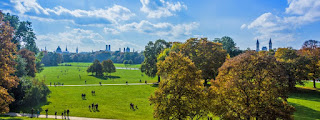Think Munich and you probably think
beer, castles and football.
Stradling the River Isar, a tributary of the Danube, it is the third-largest city in Germany behind Berlin and Hamburg.
Also take in the Viktaulien Market, Munich’s oldest open market and a major drawcard for foodies, and the old streets and squares in the area surrounding Marienplatz in the city centre with its city hall with glockenspiel chimes and the new Jewish Centre.
Distinctively different to most of the
rest of Germany, the capital of Bavaria is a very attractive blend of old and
new.
Stradling the River Isar, a tributary of the Danube, it is the third-largest city in Germany behind Berlin and Hamburg.
A global centre
of business, art, technology, science and culture, it is also a magnet for
tourists, who flock to its old quarters and squares, many of which are
pedestrian-only zones.
Home to institutions
like the Deutches Museum and BMW Museum, it is also known as a city whose
residents enjoy beer and partying – most notably at the annual Oktoberfest.
With a
history dating back to the 12th century, Munich is also a cultural
melting pot with over a third of its residents born in other countries.
With its trains,
buses and trams, Munich is easily explored using public transport. The Schloss
Nymphenburg palace and gardens and the former Dachau concentration camp are
both just a short drive from the city.
It is a city worth at least two or three days of any European itinerary.
A
Beer or Two
Munich is
known as the beer capital of the world and visitors can enjoy a range of
traditional beer halls as well as learning all about local favourites lager and
wheat beer.
The raucous
Hofbrauhaus and the Paulaner Brauhaus are both very popular but a trip to the historic
Lowenbrau Keller is de rigueur.
With wait
staff in traditional Bavarian costumes, a range of terrific beers and hearty
German food, it is a whole lot of fun.
You can even drop in for breakfast if
you wish - and on good weather days the leafy beer garden is a must. Try a
giant wiener
schnitzel or a pork knuckle.
Even though it is now owned by
American brewing giants Anheuser Busch, there is a whole lot of history dating
back several centuries. Also try beers from Spaten, Augustiner and Erdinger,
from a small brewery just outside the city.
Sporting Mecca
The Allianz Arena,
home to the famous Bayern Munich football team, is one of the highest-tech
sporting arenas in the world.
On the
northern fringe of the city, it holds 75,000 spectators and is known as the
only stadium in the world where the exterior colours constantly change.
Since 2012 it
has been home to the museum of Bayern Munich, FC Bayern Erlebniswelt. There is also a
merchandise outlet: the FC Bayern Munich Megastore, a bistro and a bar.
The stadium sits above Europe's
biggest underground car park and the roof of the stadium has built-in roller
blinds which may be drawn back and forth during games to provide protection
from the sun.
Several
behind-the-scenes tours are available.
Take a stroll
Munich is largely flat and a great
city for exploring on foot. The English Garden, which dates back to 1789 is one
of the largest urban gardens in the world.
The park, in the suburb of Schwabing, was
given the name Englische Garten because it was laid out in the style of
an English country park. Cyclists and joggers train on the 78-km-long network
of paths, and a vista of the city is offered from the Monopteros, a small Greek
temple which was added to the park landscape along with the hill in 1836.
Also take in the Viktaulien Market, Munich’s oldest open market and a major drawcard for foodies, and the old streets and squares in the area surrounding Marienplatz in the city centre with its city hall with glockenspiel chimes and the new Jewish Centre.
The Gartnerplatz and
surrounding streets are full of small shops and trendy bars popular with
locals.
Make a Movie
Bavaria Filmstadt (or Bavaria Film
City) is a movie and television studio complex on the southern fringes of the
city.
Check out movie memorabilia
including the submarine from Das Boot and the Gallic village from the
filming of Asterix and Obelix Take on Cesar.
There are also original movie sets
where visitors can star in their own mini feature under coaching of a director.
Guided tours and 4D rides are also popular.
Station Pleasures
The bustling Munich Hauptbahnhof is
much more than just the major railway station serving the city.
As you enjoy a traditional sausage
in a roll with onion and sauerkraut while you wait for your train, you’ll
probably be blissfully oblivious to the lower levels of the station.
The subterranean S-Bahn with
two platforms and U-Bahn stations
with six platforms are also part of the complex.
In recent years, the mezzanine level
linking the Hauptbahnhof to the S-Bahn and U-Bahn stations and pathways to tram
platforms have been extensively renovated.
There is a bright and lively
shopping area with several restaurants and cafes.
The bad news is the station is huge
and it is easy to get lost. The good news is 24-hour food options, luggage
lockers, paid bathrooms with showers, and free wifi. There are several hotels
of varying quality in the streets nearby.
.






the unexpected sights of English Garden Munich is very awesome I am pleased to read about it and now I am eagerly waiting to plan my travel for Germany and travel to this place to explore its beauty and the wine and beer on the table cock.
ReplyDeleteThis blog is a goldmine of knowledge. Keep sharing more of your wisdom!
ReplyDeleteSwitzerland Visa appointment